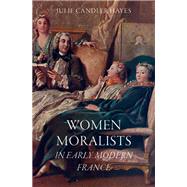Women Moralists in Early Modern France
, by Hayes, Julie Candler- ISBN: 9780197688601 | 0197688608
- Cover: Hardcover
- Copyright: 12/7/2023
Early modern women writers left their mark in multiple domains--novels, translations, letters, history, and science. Although recent scholarship in literary and cultural studies has enriched our understanding of these accomplishments, less attention has been paid to other forms of women's writing. Women Moralists in Early Modern France explores the contributions of seventeenth and eighteenth-century French women philosophers and intellectuals to moralist writing, the observation of human motives and behavior. This distinctively French genre draws on philosophical and literary traditions extending back to classical antiquity. Moralist short forms such as the maxim, dialogue, character portrait, and essay engage social and political questions, epistemology, moral psychology, and virtue ethics. Although moralist writing was closely associated with the salon culture in which women played a major role, women's contributions to the genre have received scant scholarly attention.
Julie Candler Hayes examines major moralist writers such as Madeleine de Scudéry, Anne-Thérèse de Lambert, Émilie Du Châtelet, and Germaine de Staël, as well as nearly two dozen of their contemporaries. Their reflections range from traditional topics such as the nature of the self, friendship, happiness, and old age, to issues that were very much part of their own lifeworld, such as the institution of marriage and women's nature and capabilities. Each chapter traces the evolution of women's moralist thought on a given topic from the late seventeenth century to the Enlightenment and the decades immediately following the French Revolution, a period of tremendous change in the horizon of possibilities for women as public figures and intellectuals. Hayes demonstrates how, through their critique of institutions and practices, their valorization of introspection and self-expression, and their engagement with philosophical issues, women moralists carved out an important space for the public exercise of their reason.
Julie Candler Hayes examines major moralist writers such as Madeleine de Scudéry, Anne-Thérèse de Lambert, Émilie Du Châtelet, and Germaine de Staël, as well as nearly two dozen of their contemporaries. Their reflections range from traditional topics such as the nature of the self, friendship, happiness, and old age, to issues that were very much part of their own lifeworld, such as the institution of marriage and women's nature and capabilities. Each chapter traces the evolution of women's moralist thought on a given topic from the late seventeenth century to the Enlightenment and the decades immediately following the French Revolution, a period of tremendous change in the horizon of possibilities for women as public figures and intellectuals. Hayes demonstrates how, through their critique of institutions and practices, their valorization of introspection and self-expression, and their engagement with philosophical issues, women moralists carved out an important space for the public exercise of their reason.






